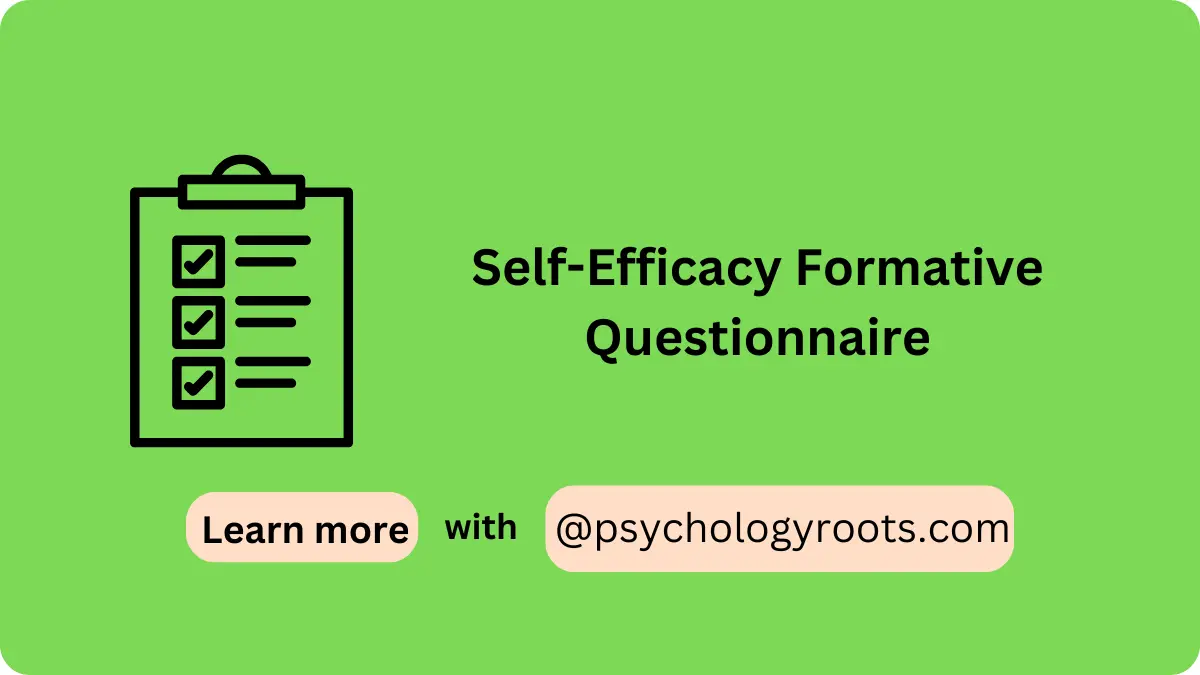Table of Contents
Self-Efficacy Formative Questionnaire
Here in this post, we are sharing the “Self-Efficacy Formative Questionnaire”. You can read psychometric and Author information. We have thousands of Scales and questionnaires in our collection (See Scales and Questionnaires). You can demand us any scale and questionnaires related to psychology through our community, and we will provide you with a short time. Keep visiting Psychology Roots.
About Self-Efficacy Formative Questionnaire
Scale Name
Self-Efficacy Formative Questionnaire
Author Details
Gaumer Erickson, A.S., Soukup, J.H., Noonan, P.M., and McGurn, L.
Translation Availability
English

Background/Description
The Self-Efficacy Formative Questionnaire is a psychometrically sound tool designed to measure an individual’s self-efficacy, which refers to their belief in their ability to succeed in specific situations or accomplish particular tasks. Self-efficacy is a critical component of social-cognitive theory and plays a significant role in motivation, learning, and performance across various domains, including education, workplace settings, and personal development.
This questionnaire is particularly useful for educators, psychologists, and researchers aiming to assess and support the development of self-efficacy in individuals. It provides actionable insights that can inform interventions, instructional strategies, and personalized support plans. The tool is designed to be formative, meaning it is intended for ongoing assessment and feedback rather than a one-time evaluation.
The Self-Efficacy Formative Questionnaire is suitable for use with adolescents and adults and has been widely adopted in educational and organizational settings. Its focus on formative assessment makes it a valuable resource for fostering growth and improvement over time.
Administration, Scoring and Interpretation
- Obtain the copy: Access the questionnaire from reputable sources, such as the official technical report or authorized publishers.
- Explain the purpose: Inform participants that the questionnaire is designed to assess their confidence in their ability to achieve specific goals or tasks.
- Provide instructions: Ask participants to respond to each item honestly, reflecting on their current beliefs and experiences.
- Approximate time: The questionnaire typically takes 10–15 minutes to complete.
- Administer the questionnaire: Distribute the questionnaire in a quiet, comfortable environment, either in paper-and-pencil format or digitally.
Reliability and Validity
The Self-Efficacy Formative Questionnaire has demonstrated strong psychometric properties:
- Reliability: The questionnaire exhibits high internal consistency, with Cronbach’s alpha coefficients consistently above 0.90, indicating excellent reliability.
- Validity: The tool has strong construct validity, supported by its alignment with theoretical frameworks of self-efficacy and its correlations with other established measures of self-efficacy. It also demonstrates discriminant validity, effectively distinguishing between different dimensions of self-efficacy.
Available Versions
13-Items
Reference
Gaumer Erickson, A.S., Soukup, J.H., Noonan, P.M., & McGurn, L. (2018). Self-efficacy formative questionnaire technical report. Retrieved from http://www.researchcollaboration.org/uploads/SelfEfficacyQuestionnaireInfo.pdf
Important Link
Scale File:
Frequently Asked Questions
What is the Self-Efficacy Formative Questionnaire?
It is a tool designed to measure an individual’s self-efficacy, or their belief in their ability to succeed in specific tasks or situations.
Who can use this questionnaire?
The questionnaire is suitable for adolescents and adults and is widely used by educators, psychologists, and researchers.
How long does it take to complete the questionnaire?
It typically takes 10–15 minutes to complete.
Is the questionnaire available in multiple languages?
Currently, the questionnaire is only available in English.
Can the questionnaire be used for ongoing assessment?
Yes, the questionnaire is designed for formative assessment, making it ideal for tracking progress and providing feedback over time.
Disclaimer
Please note that Psychology Roots does not have the right to grant permission for the use of any psychological scales or assessments listed on its website. To use any scale or assessment, you must obtain permission directly from the author or translator of the tool. Psychology Roots provides information about various tools and their administration procedures, but it is your responsibility to obtain proper permissions before using any scale or assessment. If you need further information about an author’s contact details, please submit a query to the Psychology Roots team.
Help Us Improve This Article
Have you discovered an inaccuracy? We put out great effort to give accurate and scientifically trustworthy information to our readers. Please notify us if you discover any typographical or grammatical errors.
Make a comment. We acknowledge and appreciate your efforts.
Share With Us
If you have any scale or any material related to psychology kindly share it with us at psychologyroots@gmail.com. We help others on behalf of you.